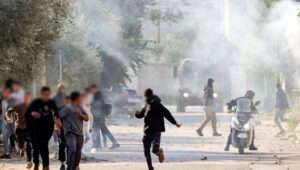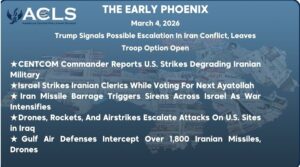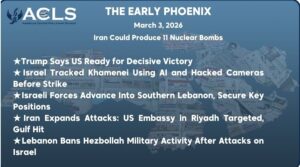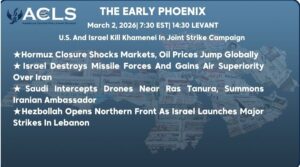The Region: A Middle East Newsletter
In this edition of THE REGION, ACLS brings you analysis of the previous week’s strategically significant news developments in the Middle East.
31-January-2023
Printable Version
ISRAEL AND PALESTINIAN TERRITORIES
1. Most Violent Week in Israeli-Palestinian Conflict Since 2021 Gaza War

In an early test of the new Israeli government of Benjamin Netanyahu, the Israeli-Palestinian conflict reignited last week with clashes in the West Bank and the largest military confrontation between Israeli forces and Palestinian militias since the 2021 Gaza war.
Political tensions between the Israeli government and the Palestinians had already mounted in early January when Netanyahu’s own national security minister, Itamar Ben Gvir, defied Netanyahu and conducted a visit to the Temple Mount that upset the status quo arrangement with Jordan concerning the Al Aqsa Mosque.
Against this political backdrop, news emerged on January 18 that Hamas sought to create a new threat to Israel using militant networks in the West Bank, an area that Israeli officials had considered calm enough that the IDF might actually reduce its presence there.
The following day, January 19, the IDF killed two Islamic Jihad militants in Jenin, and on January 25 Israeli settlers killed a Hamas member who the IDF said had attempted a knife attack near Nablus.
On January 26, IDF troops returned to Jenin seeking three Islamic Jihad militants and entered a large gun battle with Palestinian fighters in the Jenin refugee camp. Ten Palestinians were killed in the fighting, including the three Islamic Jihad fighters and several other militants, but also one civilian bystander.
In response to the raid, Hamas forces in Gaza launched a rocket attack toward the Israeli city of Ashkelon. The turbulent day ended with the IDF responding with an airstrike against a Hamas training camp in Gaza.
On January 27, the following day, a 21-year-old Palestinian gunman killed seven Jewish worshippers–including one who was a Ukrainian citizen–as they left a synagogue near Jerusalem, in the worst such attack in years.
Finally, on January 28, two Palestinians carried out gun attacks in the Jerusalem area, one of which involved a thirteen-year-old Palestinian boy who shot two Israelis before being shot and disarmed.
![]()
IRAN
2. Unprecedented Israeli Drone Strike Against IRGC Missile Program Deep Inside Iran

The weekend saw significant developments in the ongoing conflict between the Iranian regime and Israel. On January 29, Israel carried out a drone attack inside Iran, targeting a military warehouse in Isfahan belonging to the IRGC’s ballistic missile program.
Local video showed the moment that explosions hit the IRGC facility, though the Iranian regime claimed it had shot down most of the drones and the attack had left only minor damage to the roof of the building.
Middle Eastern sources claimed there were several other supposedly Israeli attacks elsewhere in Iran on the same night, but those reports appear to be conflating the Israeli operation with unrelated accidents or fires, such as an oil refinery fire that broke out in Tabriz.
Just hours after the drone attack in Isfahan, the Israelis apparently carried out another strike against IRGC forces, this time in eastern Syria. A convoy of trucks belonging to IRGC-sponsored militias was hit by an airstrike on January 29 as it crossed from Iraq into Syria near Al Bukamal using a militia-controlled crossing point frequently used by the IRGC to move weapons into Syria. On January 30, an Iranian commander was killed by another airstrike at the same site, again reportedly carried out by the Israelis.
These attacks in eastern Syria came after the IRGC and Hizballah reportedly moved a large contingent of fighters through the same crossing just days before. The strikes signal a continued pattern, established by the previous Netanyahu government, of operations to stop the IRGC from moving strategic weapons into Syria that could be used against Israel.
The drone attack inside Iran, however, is a new and significant step by the new Netanyahu government, seemingly intended to warn Supreme Leader Khamenei and his regime that Israeli leaders consider them to have crossed a redline by continuing to deploy ballistic missiles and armed drones to pose a threat to Israel. The attack’s target, an IRGC ballistic missile facility, also serves European security interests, since IRGC missiles are increasingly being used by Russia to attack Ukraine.
The Israeli attack against an IRGC target deep inside Iranian territory is a signal to Tehran that the Israelis have both the intelligence and the weapons capability to find and destroy targets they consider threatening to Israel, even targets hidden or fortified with defences. The meaning of the message will not be lost on Tehran. If the Israelis can locate and attack an undisclosed IRGC warehouse, it follows that they can locate and attack Iranian leadership targets if they choose.
![]()
IRAQ
3. Baghdad Governing Parties and Judiciary Seek to Starve Kurdistan Government of Cash

In a continuation of a years-long power struggle, the Iraqi government in Baghdad took major steps last week to starve the Kurdistan Regional Government of cash and force it to relinquish its partial autonomy over oil resources.
On January 25, the Iraqi judiciary ordered the Baghdad government to stop paying the Erbil-based Kurdistan Regional Government (KRG) its share of the Iraqi national budget. The ruling came in a lawsuit brought by a member of parliament who represents the IRGC-backed militia Asa’ib Ahl al-Haqq, a US-designated terrorist group that periodically attacks American troops and facilities in Iraq. The lawsuit alleged that the KRG has illegally sold oil and gas to Turkiye without going through the national government in Baghdad. The court order will halt the transfer of hundreds of millions of dollars meant to be used by the KRG to pay civil servant and peshmerga salaries.
The legal dispute was compounded just days later when news broke that the International Commercial Court in Paris was poised to rule in Iraq’s favor in a lawsuit against Turkiye, in which Baghdad claimed Ankara violated the two countries’ pipeline agreement by buying oil directly from the KRG.
Baghdad’s actions are ostensibly about who in Iraq has the authority to sell oil, but in actuality they are part of the larger unsettled question of how the KRG and central government relate to one another. By starving the KRG of cash, the governing parties in Baghdad threaten to break the KRG’s constitutional autonomy, a longstanding objective of Baghdad’s Shia political parties in particular.
Baghdad’s lawsuit in Paris also aims to cut the KRG’s relationship with Ankara, thereby leaving Erbil with no foreign alternative to Baghdad. This political struggle coincides with an internal Kurdish battle between the KDP, which relies upon relations with Ankara, and the PUK, which relies on relations with Tehran.
Finally, the Iranian regime is involved as well; Tehran blames the KDP for fueling Iran’s protest movement and seeks to break the KDP’s power or to partition the KRG so that half of Iraqi Kurdistan is controlled by the Tehran-friendly PUK. Last week’s court order demonstrates that Tehran has the ability to wield the Iraqi government and judiciary against the KDP for this purpose.
![]()
SYRIA/TURKIYE
4. UN Chemical Weapons Watchdog Finds Assad Responsible, and Russia Complicit, in 2018 Chemical Attack

On January 27, the UN’s Organization for the Prohibition of Chemical Weapons issued a long-awaited investigation report concluding that the Assad regime carried out a chemical weapon attack against civilians in the city of Douma in April 2018. Significantly, the UN report contained details that for the first time indicated that Russia helped facilitate the attack.
The Assad regime predictably denied the UN’s findings, but the foreign ministers of the United States, the UK, France, and Germany issued a joint statement condemning Assad’s use of chemical weapons and calling on Russia to stop shielding Assad from accountability. Turkiye and Qatar issued similar statements supporting the OPCW report.
The OPCW’s findings could be a serious obstacle to governments that hope to normalize relations with the Assad regime. On January 29, President Erdogan gave a campaign speech reiterating his recent calls for diplomatic outreach to Assad and made a new offer for Tehran’s participation in the proposed talks. But on the same day, US Treasury Undersecretary Brian Nelson vitisted Oman, the UAE, and Turkiye to warn that countries dealing with the US-sanctioned government of Russia, Iran, and Syria could lose access to the markets of the G7 countries as a result. Nelson’s warning aligned with a statement from the US Congress calling for “no normalization” for the “pariah” Assad. The sharply contrasting statements from Ankara and Washington demonstrate that Erdogan’s gambit with Assad could be on a collision course with the US government’s sanctions strategy.
![]()
Lebanon
5. Hizballah and its Allies Move to Protect Themselves from Beirut Port Investigation

On January 23, Tarek Bitar, the Lebanese investigative judge in charge of the probe into the 2020 Beirut port explosion, stunned the country by announcing the continuation of the case after a 13-month hiatus imposed by political pressure. Bitar ordered the arrest of eight senior officials for their role in the disaster, including Lebanon’s powerful chief of internal security, Abbas Ibrahim.
One day later, January 24, a rival judge, Ghassan Oweidat, ordered the government not to comply with Bitar’s orders, and then ordered the arrest of Bitar himself for “rebellion against the judiciary and usurpation of power.” Oweidat’s intervention came under immediate criticism, as Oweidat is a relative of parliamentarian Ghazi Zaiter, who is one of the suspects in Bitar’s investigation and is a member of Nabi Berri’s Amal Party, Hizballah’s closest political allies.
The opposing judicial orders show that Lebanon’s judiciary has now become a battlefield, with Hizballah and its allies attempting to use their influence within the judiciary to protect themselves from an investigation the Lebanese public broadly assumes will find Hizballah and its friends responsible for the port disaster.



